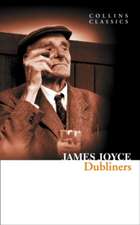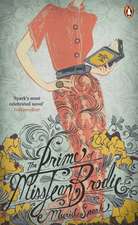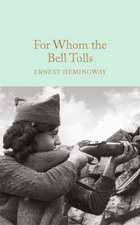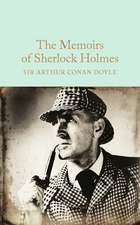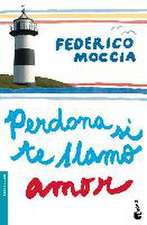Around the World in Eighty Days
Autor Jules Verne Ilustrat de Coralie Bickford-Smith Traducere de Michael Glencrossen Limba Engleză Hardback – 5 noi 2020
One night in the reform club, Phileas Fogg bets his companions that he can travel across the globe in just eighty days. Breaking the well-established routine of his daily life, he immediately sets off for Dover with his astonished valet Passepartout. Passing through exotic lands and dangerous locations, they seize whatever transportation is at hand - whether train or elephant - overcoming set-backs and always racing against the clock.
Preț: 94.45 lei
Preț vechi: 117.32 lei
-19%
Puncte Express: 142
Preț estimativ în valută:
16.69€ • 19.37$ • 14.56£
16.69€ • 19.37$ • 14.56£
Carte disponibilă
Livrare economică 27 martie-07 aprilie
Livrare express 11-17 martie pentru 51.14 lei
Specificații
ISBN-13: 9780241468654
ISBN-10: 0241468655
Pagini: 288
Dimensiuni: 142 x 205 x 27 mm
Greutate: 0.41 kg
Editura: Penguin Books
Colecția Penguin Clothbound Classics
Locul publicării:London, United Kingdom
ISBN-10: 0241468655
Pagini: 288
Dimensiuni: 142 x 205 x 27 mm
Greutate: 0.41 kg
Editura: Penguin Books
Colecția Penguin Clothbound Classics
Locul publicării:London, United Kingdom
Notă biografică
Jules Verne was born in France in 1828 and died in 1905. His collaboration with the publisher Pierre-Jules Hetzel was wildly successful, producing many brilliant novels in the burgeoning genre of science fiction: 20,000 Leagues Under the Sea, Journey to the Centre of the Earth and Around the World in 80 Days, among others. Verne is the second most translated author in the world, after Agatha Christie and before Shakespeare.
Extras
CHAPTER 1
In which Phileas Fogg and Passepartout accept each other, the one as master, the other as man
MR. PHILEAS Fogg lived, in 1872, at No. 7, Saville Row, Burlington Gardens, the house in which Sheridan died in 1814. He was one of the most noticeable members of the Reform Club, though he seemed always to avoid attracting attention; an enigmatical personage, about whom little was known, except that he was a polished man of the world. People said that he resembled Byron,--at least that his head was Byronic; but he was a bearded, tranquil Byron, who might live on a thousand years without growing old.
Certainly an Englishman it was more doubtful whether Phileas Fogg was a Londoner. He was never seen on 'Change, nor at the Bank, nor in the counting-rooms of the "City"; no ships ever came into London docks of which he was the owner; he had no public employment; he had never been entered at any of the Inns of Court, either at the Temple, or Lincoln's Inn, or Gray's Inn; nor had his voice ever resounded in the Court of Chancery, or in the Exchequer, or the Queen's Bench, or the Ecclesiastical Courts. He certainly was not a manufacturer; nor was he a merchant or a gentleman farmer. His name was strange to the scientific and learned societies, and he never was known to take part in the sage deliberations of the Royal Institution or the London Institution, the Artisan's Association or the Institution of Arts and Sciences. He belonged, in fact, to none of the numerous societies which swarm in the English capital, from the Harmonic to that of the Entomologists, founded mainly for the purpose of abolishing pernicious insects.
Phileas Fogg was a member of the Reform, and that was all.
The way in which he got admission to this exclusive club was simple enough.
He was recommended by the Barings, with whom he had an open credit. His checks were regularly paid at sight from his account current, which was always flush.
Was Phileas Fogg rich? Undoubtedly. But those who knew him best could not imagine how he had made his fortune, and Mr. Fogg was the last person to whom to apply for the information. He was not lavish, nor, on the contrary, avaricious; for whenever he knew that money was needed for a noble, useful, or benevolent purpose, he supplied it quickly, and sometimes anonymously. He was, in short, the least communicative of men. He talked very little, and seemed all the more mysterious for his taciturn manner. His daily habits were quite open to observation; but whatever he did was so exactly the same thing that he had always done before, that the wits of the curious were fairly puzzled.
Had he travelled? It was likely, for no one seemed to know the world more familiarly; there was no spot so secluded that he did not appear to have an intimate acquaintance with it. He often corrected, with a few clear words, the thousand conjectures advanced by members of the club as to lost and unheard-of travellers, pointing out the true probabilities, and seeming as if gifted with a sort of second sight, so often did events justify his predictions. He must have travelled everywhere, at least in the spirit.
It was at least certain that Phileas Fogg had not absented himself from London for many years. Those who were honoured by a better acquaintance with him than the rest, declared that nobody could pretend to have ever seen him anywhere else. His sole pastimes were reading the papers and playing whist. He often won at this game, which, as a silent one, harmonized with his nature; but his winnings never went into his purse, being reserved as a fund for his charities. Mr. Fogg played, not to win, but for the sake of playing. The game was in his eyes a contest, a struggle with a difficulty, yet a motionless, unwearying struggle, congenial to his tastes.
Phileas Fogg was not known to have either wife or children, which may happen to the most honest people; either relatives or near friends, which is certainly more unusual. He lived alone in his house in Saville Row, whither none penetrated. A single domestic sufficed to serve him. He breakfasted and dined at the club, at hours mathematically fixed, in the same room, at the same table, never taking his meals with other members, much less bringing a guest with him; and went home at exactly midnight, only to retire at once to bed. He never used the cosy chambers which the Reform provides for its favoured members. He passed ten hours out of the twenty-four in Saville Row, either in sleeping or making his toilet. When he chose to take a walk, it was with a regular step in the entrance hall with its mosaic flooring, or in the circular gallery with its dome supported by twenty red porphyry Ionic columns, and illumined by blue painted windows. When he breakfasted or dined, all the resources of the club--its kitchens and pantries, its buttery and dairy--aided to crowd his table with their most succulent stores; he was served by the gravest waiters, in dress coats, and shoes with swan-skin soles, who proffered the viands in special porcelain, and on the finest linen; club decanters, of a lost mould, contained his sherry, his port, and his cinnamon-spiced claret; while his beverages were refreshingly cooled with ice, brought at great cost from the American lakes.
If to live in this style is to be eccentric, it must be confessed that there is something good in eccentricity!
The mansion in Saville Row, though not sumptuous, was exceedingly comfortable. The habits of its occupant were such as to demand but little from the sole domestic; but Phileas Fogg required him to be almost superhumanly prompt and regular. On this very 2nd of October he had dismissed James Forster, because that luckless youth had brought him shaving-water at eighty-four degrees Fahrenheit instead of eighty-six; and he was awaiting his successor, who was due at the house between eleven and half-past.
Phileas Fogg was seated squarely in his arm-chair, his feet close together like those of a grenadier on parade, his hands resting on his knees, his body straight, his head erect; he was steadily watching a complicated clock which indicated the hours, the minutes, the seconds, the days, the months, and the years. At exactly half-past eleven Mr. Fogg would, according to his daily habit, quit Saville Row, and repair to the Reform.
A rap at this moment sounded on the door of the cosy apartment where Phileas Fogg was seated, and James Forster, the dismissed servant, appeared.
"The new servant," said he.
A young man of thirty advanced and bowed.
"You are a Frenchman, I believe," asked Phileas Fogg, "and your name is John?"
"Jean, if monsieur pleases," replied the new-comer, "Jean Passepartout, a surname which has clung to me because I have a natural aptness for going out of one business into another. I believe I'm honest, monsieur, but, to be outspoken, I've had several trades. I've been an itinerant singer, a circus-rider, when I used to vault like Leotard, and dance on a rope like Blondin. Then I got to be a professor of gymnastics, so as to make better use of my talents; and then I was a sergeant fireman at Paris, and assisted at many a big fire. But I quitted France five years ago, and, wishing to taste the sweets of domestic life, took service as a valet here in England. Finding myself out of place, and hearing that Monsieur Phileas Fogg was the most exact and settled gentleman in the United Kingdom, I have come to monsieur in hope of living with him a tranquil life, and forgetting even the name of Passepartout."
"Passepartout suits me," responded Mr. Fogg. "You are well recommended to me; I hear a good report of you. You know my conditions?"
"Yes, monsieur."
"Good. What time is it?"
"Twenty-two minutes after eleven," returned Passepartout, drawing an enormous silver watch from the depths of his pocket.
"You are too slow," said Mr. Fogg.
"Pardon me, monsieur, it is impossible--"
"You are four minutes too slow. No matter; it's enough to mention the error. Now from this moment, twenty-nine minutes after eleven, a.m., this Wednesday, October 2nd, you are in my service."
Phileas Fogg got up, took his hat in his left hand, put it on his head with an automatic motion, and went off without a word.
Passepartout heard the street door shut once; it was his new master going out. He heard it shut again; it was his predecessor, James Forster, departing in his turn. Passepartout remained alone in the house in Saville Row.
CHAPTER 2
In which Passepartout is convinced that he has at last found his ideal
FAITH," MUTTERED Passepartout, somewhat flurried, "I've seen people at Madame Tussaud's as lively as my new master!"
Madame Tussaud's "people," let it be said, are of wax, and are much visited in London; speech is all that is wanting to make them human.
During his brief interview with Mr. Fogg, Passepartout had been carefully observing him. He appeared to be a man about forty years of age, with fine, handsome features, and a tall, well-shaped figure; his hair and whiskers were light, his forehead compact and unwrinkled, his face rather pale, his teeth magnificent. His countenance possessed in the highest degree what physiognomists call "repose in action," a quality of those who act rather than talk. Calm and phlegmatic, with a clear eye, Mr. Fogg seemed a perfect type of that English composure which Angelica Kauffmann has so skilfully represented on canvas. Seen in the various phases of his daily life, he gave the idea of being perfectly well-balanced, as exactly regulated as a Leroy chronometer. Phileas Fogg was, indeed, exactitude personified, and this was betrayed even in the expression of his very hands and feet; for in men, as well as in animals, the limbs themselves are expressive of the passions.
He was so exact that he was never in a hurry, was always ready, and was economical alike of his steps and his motions. He never took one step too many, and always went to his destination by the shortest cut; he made no superfluous gestures, and was never seen to be moved or agitated. He was the most deliberate person in the world, yet always reached his destination at the exact moment.
He lived alone, and so to speak, outside of every social relation; and as he knew that in this world account must be taken of friction, and that friction retards, he never rubbed against anybody.
As for Passepartout, he was a true Parisian of Paris. Since he had abandoned his own country for England, taking service as a valet, he had in vain searched for a master after his own heart. Passepartout was by no means one of those pert dunces depicted by Molire, with a bold gaze and a nose held high in the air; he was an honest fellow, with a pleasant face, lips a trifle protruding, soft-mannered and serviceable, with a good round head, such as one likes to see on the shoulders of a friend. His eyes were blue, his complexion rubicund, his figure almost portly and well built, his body muscular, and his physical powers fully developed by the exercises of his younger days. His brown hair was somewhat tumbled; for while the ancient sculptors are said to have known eighteen methods of arranging Minerva's tresses, Passepartout was familiar with but one of dressing his own: three strokes of a large-tooth comb completed his toilet.
It would be rash to predict how Passepartout's lively nature would agree with Mr. Fogg. It was impossible to tell whether the new servant would turn out as absolutely methodical as his master required; experience alone could solve the question. Passepartout had been a sort of vagrant in his early years, and now yearned for repose; but so far he had failed to find it, though he had already served in ten English houses. But he could not take root in any of these; with chagrin he found his masters invariably whimsical and irregular, constantly running about the country, or on the look-out for adventure. His last master, young Lord Longferry, Member of Parliament, after passing his nights in the Haymarket taverns, was too often brought home in the morning on policemen's shoulders. Passepartout, desirous of respecting the gentleman whom he served, ventured a mild remonstrance on such conduct; which being ill received, he took his leave. Hearing that Mr. Phileas Fogg was looking for a servant, and that his life was one of unbroken regularity, that he neither travelled nor stayed from home overnight, he felt sure that this would be the place he was after. He presented himself, and was accepted, as has been seen.
At half-past eleven, then, Passepartout found himself alone in the house in Saville Row. He began its inspection without delay, scouring it from cellar to garret. So clean, well-arranged, solemn a mansion pleased him; it seemed to him like a snail's shell, lighted and warmed by gas, which sufficed for both these purposes. When Passepartout reached the second story, he recognized at once the room which he was to inhabit, and he was well satisfied with it. Electric bells and speaking-tubes afforded communication with the lower stories; while on the mantel stood an electric clock, precisely like that in Mr. Fogg's bedchamber, both beating the same second at the same instant. "That's good, that'll do," said Passepartout to himself.
He suddenly observed, hung over the clock, a card which, upon inspection, proved to be a programme of the daily routine of the house. It comprised all that was required of the servant, from eight in the morning, exactly at which hour Phileas Fogg rose, till half-past eleven, when he left the house for the Reform Club,--all the details of service, the tea and toast at twenty-three minutes past eight, the shaving-water at thirty-seven minutes past nine, and the toilet at twenty minutes before ten. Everything was regulated and foreseen that was to be done from half-past eleven a.m. till midnight, the hour at which the methodical gentleman retired.
Mr. Fogg's wardrobe was amply supplied and in the best taste. Each pair of trousers, coat, and vest bore a number, indicating the time of year and season at which they were in turn to be laid out for wearing; and the same system was applied to the master's shoes. In short, the house in Saville Row, which must have been a very temple of disorder and unrest under the illustrious but dissipated Sheridan, was cosiness, comfort, and method idealized. There was no study, nor were there books, which would have been quite useless to Mr. Fogg; for at the Reform two libraries, one of general literature and the other of law and politics, were at his service. A moderate-sized safe stood in his bedroom, constructed so as to defy fire as well as burglars; but Passepartout found neither arms nor hunting weapons anywhere; everything betrayed the most tranquil and peaceable habits.
In which Phileas Fogg and Passepartout accept each other, the one as master, the other as man
MR. PHILEAS Fogg lived, in 1872, at No. 7, Saville Row, Burlington Gardens, the house in which Sheridan died in 1814. He was one of the most noticeable members of the Reform Club, though he seemed always to avoid attracting attention; an enigmatical personage, about whom little was known, except that he was a polished man of the world. People said that he resembled Byron,--at least that his head was Byronic; but he was a bearded, tranquil Byron, who might live on a thousand years without growing old.
Certainly an Englishman it was more doubtful whether Phileas Fogg was a Londoner. He was never seen on 'Change, nor at the Bank, nor in the counting-rooms of the "City"; no ships ever came into London docks of which he was the owner; he had no public employment; he had never been entered at any of the Inns of Court, either at the Temple, or Lincoln's Inn, or Gray's Inn; nor had his voice ever resounded in the Court of Chancery, or in the Exchequer, or the Queen's Bench, or the Ecclesiastical Courts. He certainly was not a manufacturer; nor was he a merchant or a gentleman farmer. His name was strange to the scientific and learned societies, and he never was known to take part in the sage deliberations of the Royal Institution or the London Institution, the Artisan's Association or the Institution of Arts and Sciences. He belonged, in fact, to none of the numerous societies which swarm in the English capital, from the Harmonic to that of the Entomologists, founded mainly for the purpose of abolishing pernicious insects.
Phileas Fogg was a member of the Reform, and that was all.
The way in which he got admission to this exclusive club was simple enough.
He was recommended by the Barings, with whom he had an open credit. His checks were regularly paid at sight from his account current, which was always flush.
Was Phileas Fogg rich? Undoubtedly. But those who knew him best could not imagine how he had made his fortune, and Mr. Fogg was the last person to whom to apply for the information. He was not lavish, nor, on the contrary, avaricious; for whenever he knew that money was needed for a noble, useful, or benevolent purpose, he supplied it quickly, and sometimes anonymously. He was, in short, the least communicative of men. He talked very little, and seemed all the more mysterious for his taciturn manner. His daily habits were quite open to observation; but whatever he did was so exactly the same thing that he had always done before, that the wits of the curious were fairly puzzled.
Had he travelled? It was likely, for no one seemed to know the world more familiarly; there was no spot so secluded that he did not appear to have an intimate acquaintance with it. He often corrected, with a few clear words, the thousand conjectures advanced by members of the club as to lost and unheard-of travellers, pointing out the true probabilities, and seeming as if gifted with a sort of second sight, so often did events justify his predictions. He must have travelled everywhere, at least in the spirit.
It was at least certain that Phileas Fogg had not absented himself from London for many years. Those who were honoured by a better acquaintance with him than the rest, declared that nobody could pretend to have ever seen him anywhere else. His sole pastimes were reading the papers and playing whist. He often won at this game, which, as a silent one, harmonized with his nature; but his winnings never went into his purse, being reserved as a fund for his charities. Mr. Fogg played, not to win, but for the sake of playing. The game was in his eyes a contest, a struggle with a difficulty, yet a motionless, unwearying struggle, congenial to his tastes.
Phileas Fogg was not known to have either wife or children, which may happen to the most honest people; either relatives or near friends, which is certainly more unusual. He lived alone in his house in Saville Row, whither none penetrated. A single domestic sufficed to serve him. He breakfasted and dined at the club, at hours mathematically fixed, in the same room, at the same table, never taking his meals with other members, much less bringing a guest with him; and went home at exactly midnight, only to retire at once to bed. He never used the cosy chambers which the Reform provides for its favoured members. He passed ten hours out of the twenty-four in Saville Row, either in sleeping or making his toilet. When he chose to take a walk, it was with a regular step in the entrance hall with its mosaic flooring, or in the circular gallery with its dome supported by twenty red porphyry Ionic columns, and illumined by blue painted windows. When he breakfasted or dined, all the resources of the club--its kitchens and pantries, its buttery and dairy--aided to crowd his table with their most succulent stores; he was served by the gravest waiters, in dress coats, and shoes with swan-skin soles, who proffered the viands in special porcelain, and on the finest linen; club decanters, of a lost mould, contained his sherry, his port, and his cinnamon-spiced claret; while his beverages were refreshingly cooled with ice, brought at great cost from the American lakes.
If to live in this style is to be eccentric, it must be confessed that there is something good in eccentricity!
The mansion in Saville Row, though not sumptuous, was exceedingly comfortable. The habits of its occupant were such as to demand but little from the sole domestic; but Phileas Fogg required him to be almost superhumanly prompt and regular. On this very 2nd of October he had dismissed James Forster, because that luckless youth had brought him shaving-water at eighty-four degrees Fahrenheit instead of eighty-six; and he was awaiting his successor, who was due at the house between eleven and half-past.
Phileas Fogg was seated squarely in his arm-chair, his feet close together like those of a grenadier on parade, his hands resting on his knees, his body straight, his head erect; he was steadily watching a complicated clock which indicated the hours, the minutes, the seconds, the days, the months, and the years. At exactly half-past eleven Mr. Fogg would, according to his daily habit, quit Saville Row, and repair to the Reform.
A rap at this moment sounded on the door of the cosy apartment where Phileas Fogg was seated, and James Forster, the dismissed servant, appeared.
"The new servant," said he.
A young man of thirty advanced and bowed.
"You are a Frenchman, I believe," asked Phileas Fogg, "and your name is John?"
"Jean, if monsieur pleases," replied the new-comer, "Jean Passepartout, a surname which has clung to me because I have a natural aptness for going out of one business into another. I believe I'm honest, monsieur, but, to be outspoken, I've had several trades. I've been an itinerant singer, a circus-rider, when I used to vault like Leotard, and dance on a rope like Blondin. Then I got to be a professor of gymnastics, so as to make better use of my talents; and then I was a sergeant fireman at Paris, and assisted at many a big fire. But I quitted France five years ago, and, wishing to taste the sweets of domestic life, took service as a valet here in England. Finding myself out of place, and hearing that Monsieur Phileas Fogg was the most exact and settled gentleman in the United Kingdom, I have come to monsieur in hope of living with him a tranquil life, and forgetting even the name of Passepartout."
"Passepartout suits me," responded Mr. Fogg. "You are well recommended to me; I hear a good report of you. You know my conditions?"
"Yes, monsieur."
"Good. What time is it?"
"Twenty-two minutes after eleven," returned Passepartout, drawing an enormous silver watch from the depths of his pocket.
"You are too slow," said Mr. Fogg.
"Pardon me, monsieur, it is impossible--"
"You are four minutes too slow. No matter; it's enough to mention the error. Now from this moment, twenty-nine minutes after eleven, a.m., this Wednesday, October 2nd, you are in my service."
Phileas Fogg got up, took his hat in his left hand, put it on his head with an automatic motion, and went off without a word.
Passepartout heard the street door shut once; it was his new master going out. He heard it shut again; it was his predecessor, James Forster, departing in his turn. Passepartout remained alone in the house in Saville Row.
CHAPTER 2
In which Passepartout is convinced that he has at last found his ideal
FAITH," MUTTERED Passepartout, somewhat flurried, "I've seen people at Madame Tussaud's as lively as my new master!"
Madame Tussaud's "people," let it be said, are of wax, and are much visited in London; speech is all that is wanting to make them human.
During his brief interview with Mr. Fogg, Passepartout had been carefully observing him. He appeared to be a man about forty years of age, with fine, handsome features, and a tall, well-shaped figure; his hair and whiskers were light, his forehead compact and unwrinkled, his face rather pale, his teeth magnificent. His countenance possessed in the highest degree what physiognomists call "repose in action," a quality of those who act rather than talk. Calm and phlegmatic, with a clear eye, Mr. Fogg seemed a perfect type of that English composure which Angelica Kauffmann has so skilfully represented on canvas. Seen in the various phases of his daily life, he gave the idea of being perfectly well-balanced, as exactly regulated as a Leroy chronometer. Phileas Fogg was, indeed, exactitude personified, and this was betrayed even in the expression of his very hands and feet; for in men, as well as in animals, the limbs themselves are expressive of the passions.
He was so exact that he was never in a hurry, was always ready, and was economical alike of his steps and his motions. He never took one step too many, and always went to his destination by the shortest cut; he made no superfluous gestures, and was never seen to be moved or agitated. He was the most deliberate person in the world, yet always reached his destination at the exact moment.
He lived alone, and so to speak, outside of every social relation; and as he knew that in this world account must be taken of friction, and that friction retards, he never rubbed against anybody.
As for Passepartout, he was a true Parisian of Paris. Since he had abandoned his own country for England, taking service as a valet, he had in vain searched for a master after his own heart. Passepartout was by no means one of those pert dunces depicted by Molire, with a bold gaze and a nose held high in the air; he was an honest fellow, with a pleasant face, lips a trifle protruding, soft-mannered and serviceable, with a good round head, such as one likes to see on the shoulders of a friend. His eyes were blue, his complexion rubicund, his figure almost portly and well built, his body muscular, and his physical powers fully developed by the exercises of his younger days. His brown hair was somewhat tumbled; for while the ancient sculptors are said to have known eighteen methods of arranging Minerva's tresses, Passepartout was familiar with but one of dressing his own: three strokes of a large-tooth comb completed his toilet.
It would be rash to predict how Passepartout's lively nature would agree with Mr. Fogg. It was impossible to tell whether the new servant would turn out as absolutely methodical as his master required; experience alone could solve the question. Passepartout had been a sort of vagrant in his early years, and now yearned for repose; but so far he had failed to find it, though he had already served in ten English houses. But he could not take root in any of these; with chagrin he found his masters invariably whimsical and irregular, constantly running about the country, or on the look-out for adventure. His last master, young Lord Longferry, Member of Parliament, after passing his nights in the Haymarket taverns, was too often brought home in the morning on policemen's shoulders. Passepartout, desirous of respecting the gentleman whom he served, ventured a mild remonstrance on such conduct; which being ill received, he took his leave. Hearing that Mr. Phileas Fogg was looking for a servant, and that his life was one of unbroken regularity, that he neither travelled nor stayed from home overnight, he felt sure that this would be the place he was after. He presented himself, and was accepted, as has been seen.
At half-past eleven, then, Passepartout found himself alone in the house in Saville Row. He began its inspection without delay, scouring it from cellar to garret. So clean, well-arranged, solemn a mansion pleased him; it seemed to him like a snail's shell, lighted and warmed by gas, which sufficed for both these purposes. When Passepartout reached the second story, he recognized at once the room which he was to inhabit, and he was well satisfied with it. Electric bells and speaking-tubes afforded communication with the lower stories; while on the mantel stood an electric clock, precisely like that in Mr. Fogg's bedchamber, both beating the same second at the same instant. "That's good, that'll do," said Passepartout to himself.
He suddenly observed, hung over the clock, a card which, upon inspection, proved to be a programme of the daily routine of the house. It comprised all that was required of the servant, from eight in the morning, exactly at which hour Phileas Fogg rose, till half-past eleven, when he left the house for the Reform Club,--all the details of service, the tea and toast at twenty-three minutes past eight, the shaving-water at thirty-seven minutes past nine, and the toilet at twenty minutes before ten. Everything was regulated and foreseen that was to be done from half-past eleven a.m. till midnight, the hour at which the methodical gentleman retired.
Mr. Fogg's wardrobe was amply supplied and in the best taste. Each pair of trousers, coat, and vest bore a number, indicating the time of year and season at which they were in turn to be laid out for wearing; and the same system was applied to the master's shoes. In short, the house in Saville Row, which must have been a very temple of disorder and unrest under the illustrious but dissipated Sheridan, was cosiness, comfort, and method idealized. There was no study, nor were there books, which would have been quite useless to Mr. Fogg; for at the Reform two libraries, one of general literature and the other of law and politics, were at his service. A moderate-sized safe stood in his bedroom, constructed so as to defy fire as well as burglars; but Passepartout found neither arms nor hunting weapons anywhere; everything betrayed the most tranquil and peaceable habits.
Recenzii
“The reason Verne is still read by millions today is simply that he was one of the best storytellers who ever lived.”—Arthur C. Clarke
From the Trade Paperback edition.
From the Trade Paperback edition.
Descriere
Descriere de la o altă ediție sau format:
Having assured the members of London's exclusive Reform Club that he will circumnavigate the world in 80 days, Fogg - stiff, repressed, English - starts by joining forces with an irrepressible Frenchman, Passepartout, and then with a ravishing Indian beauty, Aouda. Together they slice through jungles, over snowbound passes, even across an entire isthmus - only to get back five minutes late. Fogg faces despair and suicide, but Aouda makes a new man of him, able to face even the Reform Club again. Around the World in Eighty Days (1872) contains a strong dose of post-Romantic reality plus extensive borrowing from the author's own Journey to England and Scotland - but not a shred of science fiction. Its modernism lies instead in the experimental literary technique, with parallel plots, a narrator constantly made to look foolish, four characters in search of their own unconscious, and a unique twisting of space and time. Verne's classic, a bestseller for over a century, has never appeared in a critical edition before. William Butcher's stylish new translation moves as fast and as brilliantly as Fogg's own journey. ABOUT THE SERIES: For over 100 years Oxford World's Classics has made available the widest range of literature from around the globe. Each affordable volume reflects Oxford's commitment to scholarship, providing the most accurate text plus a wealth of other valuable features, including expert introductions by leading authorities, helpful notes to clarify the text, up-to-date bibliographies for further study, and much more.
Having assured the members of London's exclusive Reform Club that he will circumnavigate the world in 80 days, Fogg - stiff, repressed, English - starts by joining forces with an irrepressible Frenchman, Passepartout, and then with a ravishing Indian beauty, Aouda. Together they slice through jungles, over snowbound passes, even across an entire isthmus - only to get back five minutes late. Fogg faces despair and suicide, but Aouda makes a new man of him, able to face even the Reform Club again. Around the World in Eighty Days (1872) contains a strong dose of post-Romantic reality plus extensive borrowing from the author's own Journey to England and Scotland - but not a shred of science fiction. Its modernism lies instead in the experimental literary technique, with parallel plots, a narrator constantly made to look foolish, four characters in search of their own unconscious, and a unique twisting of space and time. Verne's classic, a bestseller for over a century, has never appeared in a critical edition before. William Butcher's stylish new translation moves as fast and as brilliantly as Fogg's own journey. ABOUT THE SERIES: For over 100 years Oxford World's Classics has made available the widest range of literature from around the globe. Each affordable volume reflects Oxford's commitment to scholarship, providing the most accurate text plus a wealth of other valuable features, including expert introductions by leading authorities, helpful notes to clarify the text, up-to-date bibliographies for further study, and much more.


